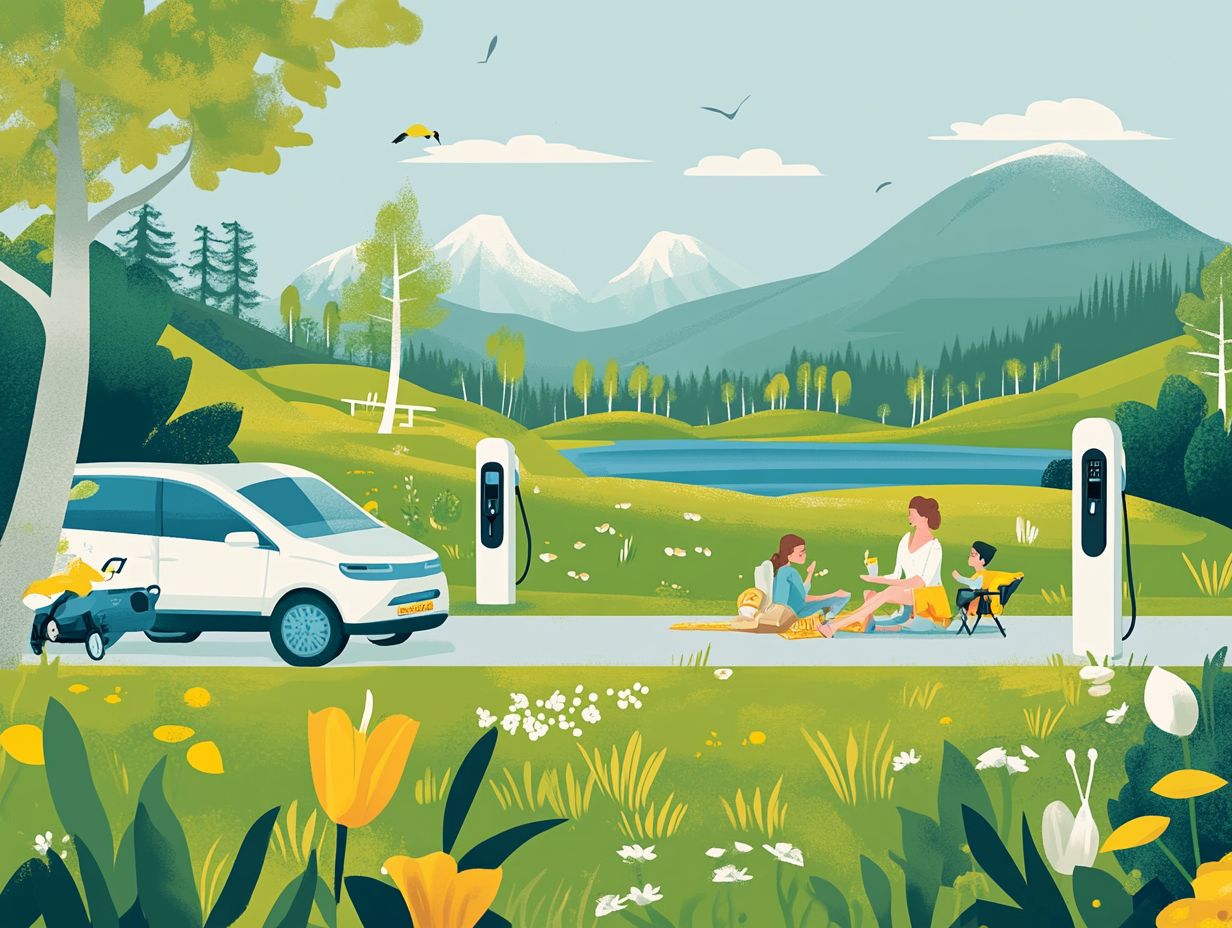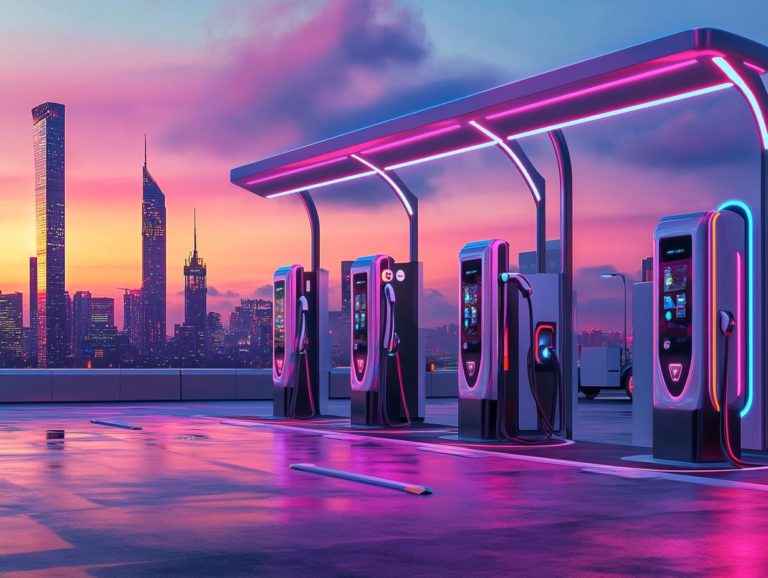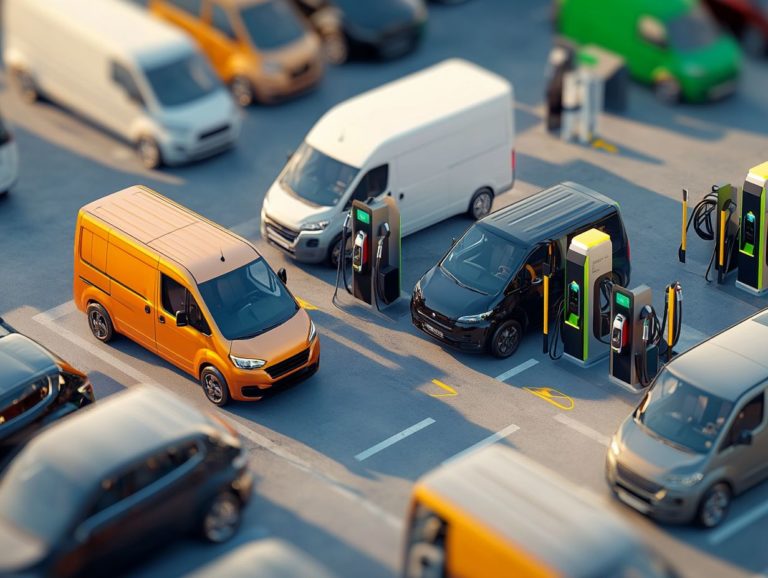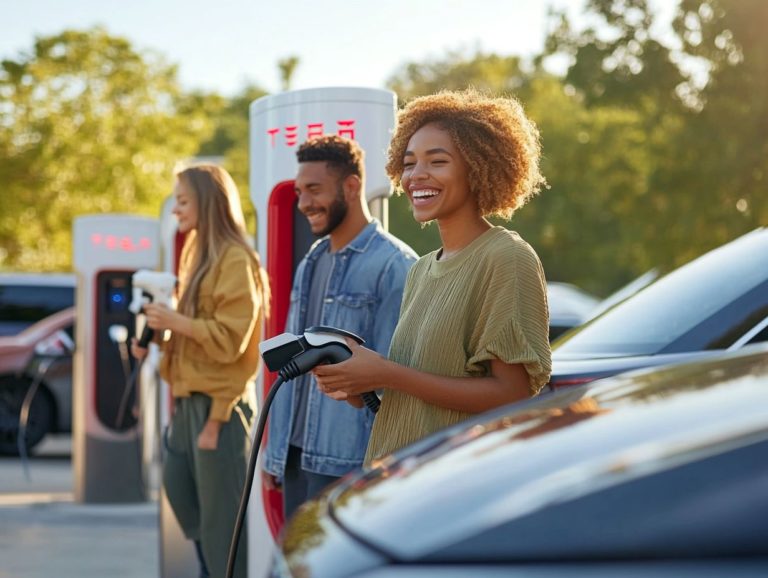the environmental benefits of ev charging
Electric vehicle (EV) charging isn t merely a way to energize your car; it plays a crucial role in combating climate change and pollution.
As urban landscapes transform and the global community embraces sustainability, grasping the significance of EV charging in diminishing your carbon footprint and enhancing air quality becomes essential.
This discussion delves into the benefits of EV charging, highlighting its influence on energy consumption and renewable resources, as well as the incentives that encourage its widespread adoption.
Together, you ll discover the profound impact of EV charging on our planet and the initiatives driving this green revolution onward.
Contents
- Key Takeaways:
- Reducing Carbon Footprint with EV Charging
- Benefits of EV Charging for Air Quality
- Impact of EV Charging on Energy Consumption
- Incentives and Policies for Promoting EV Charging
- Frequently Asked Questions
- What are the environmental benefits of EV charging?
- How can I participate in EV initiatives?
- How does EV charging help combat climate change?
- Do EVs require special chargers for environmental benefits?
- What other environmental benefits do EVs offer?
- Are there any financial benefits to EV charging?
- Can EV charging have a positive impact on local air quality?
Key Takeaways:
- EV charging plays a crucial role in reducing carbon footprints and combating climate change.
- Transitioning to EV charging can improve air quality in cities and beyond, leading to a healthier environment for all.
- EV charging is more energy efficient and encourages the use of renewable energy sources, creating a sustainable future.

What is EV Charging and Why is it Important?
EV charging is an essential part of the electric vehicle (EV) ecosystem, paving the way for a shift from traditional gas-powered vehicles to electric models like the Tesla Model Y and Chevrolet Bolt.
As you witness the global surge in EV adoption, the significance of charging stations and a robust charging infrastructure becomes crystal clear. They form the backbone of the expanding electric vehicle market, ensuring that public charging solutions are widely accessible.
Smart EV chargers boost efficiency and convenience. Innovative software, such as AmpUp, elevates your charging experience.
But the importance of EV charging goes beyond mere convenience; it s vital for reducing carbon emissions and promoting sustainable transportation solutions.
A well-established network of charging stations helps alleviate range anxiety, which is the fear of running out of battery while driving. Thanks to advancements in technology like smart EV chargers you can optimize your charging schedules and take advantage of lower energy rates during off-peak hours.
These innovations not only simplify the charging process but also contribute to a more sustainable power grid, highlighting how crucial EV charging is in shaping a cleaner future.
Reducing Carbon Footprint with EV Charging
Reducing the carbon footprint linked to transportation is essential in the fight against climate change. Electric vehicle (EV) charging is pivotal in this mission, helping to minimize greenhouse gas emissions.
By embracing electric vehicles, you can make a substantial dent in CO2 emissions, particularly when combined with battery recycling efforts and the integration of renewable energy sources to power charging stations.
This shift not only tackles the environmental challenges posed by the transportation sector but also harmonizes with sustainability initiatives designed to lessen dependence on fossil fuels.
How EV Charging Helps Combat Climate Change
EV charging stands as a crucial force in the fight against climate change, allowing you to embrace electric vehicles that significantly lower the carbon footprint of the transportation sector.
This transition contributes to reducing greenhouse gas emissions and aligns seamlessly with renewable energy initiatives, as many EVs draw power from increasingly cleaner sources like solar and wind.
As you witness these vehicles gaining popularity, you’ll notice the cumulative effect leading to enhanced air quality, delivering invaluable public health benefits by mitigating respiratory issues associated with traditional vehicle emissions.
Integrating electric vehicles into our daily lives is vital for a cleaner tomorrow! It inspires cities and countries to adopt sustainable practices that can further amplify efforts to protect the environment.
Benefits of EV Charging for Air Quality

The advantages of EV charging transcend simple convenience; they significantly contribute to improving air quality by cutting down emissions from traditional gas-powered vehicles and fostering a cleaner environment, as highlighted in the environmental impact of electric vehicles.
As electric vehicles increasingly replace gasoline-powered cars, the decrease in CO2 emissions directly links to better public health outcomes. This makes EV charging a vital component of sustainability initiatives that promote cleaner urban living.
Take action today! Consider transitioning to electric vehicles and utilizing EV charging solutions to contribute to a sustainable future.
Improving Air Quality in Cities and Beyond
Improving air quality in urban areas is one of the most immediate benefits of increased EV adoption and charging infrastructure, as outlined in what are the benefits of driving electric?
Electric vehicles produce zero tailpipe emissions, unlike traditional gas-powered vehicles.
This transition leads to significant reductions in CO2 emissions and minimizes harmful pollutants like nitrogen oxides and particulate matter.
By shifting urban fleets toward electric options and expanding accessible charging stations, you can help create cleaner, healthier environments that reduce respiratory illnesses and other health issues linked to poor air quality.
The decrease in these pollutants enhances the overall quality of life for residents, resulting in more vibrant communities and sustainable urban development.
Your efforts support long-term climate goals, creating a better future for environmental sustainability in metropolitan areas.
Impact of EV Charging on Energy Consumption
The impact of EV charging on energy consumption is significant. It champions energy efficiency through electric vehicle adoption.
However, it also requires substantial improvements in charging infrastructure to meet the increasing demand from the electric power sector.
By incorporating renewable energy sources into the charging process, you can enhance energy security while reducing dependence on traditional energy sources.
This ultimately reshapes the entire landscape of energy consumption.
Efficiency and Renewable Energy Sources
The relationship between EV charging and energy efficiency is essential.
Charging stations that harness renewable energy sources allow electric vehicles to operate with minimal reliance on fossil fuels.
This transition fosters a cleaner energy environment and significantly reduces greenhouse gas emissions.
By integrating diverse renewable options such as solar, wind, and hydroelectric power charging stations can effectively capture natural energy flows, enhancing their sustainability.
For you, this means lower energy costs and greater energy independence while contributing to a healthier planet by reducing pollution.
As awareness of renewable energy benefits expands, you will likely find even greater value in sustainable charging solutions.
This paves the way for wider acceptance and adoption of electric vehicles.
Incentives and Policies for Promoting EV Charging

Incentives and policies are vital in advancing EV charging.
They motivate both government and private sector initiatives to enhance the accessibility of electric vehicle supply equipment and public charging stations.
The Clean Vehicle Tax Credits serve as a prime example of governmental efforts designed to boost EV adoption.
These initiatives play a significant role in promoting sustainability for a greener future.
Government and Private Sector Initiatives
Government and private sector initiatives are essential for advancing EV charging infrastructure.
Both play pivotal roles in expanding public charging stations and electric vehicle supply equipment.
These efforts cultivate a collaborative environment that drives innovation and simplifies the deployment of charging facilities.
Key initiatives include public-private partnerships that harness funding, share technology, and engage in strategic planning to enhance charging network accessibility.
By aligning priorities and pooling resources, these partnerships address gaps in charging availability.
This makes electric vehicles increasingly feasible for the average consumer.
The impact of these collaborative efforts is evident in the growing number of charging stations being installed in both urban and rural areas.
This ultimately fosters broader acceptance and adoption of electric vehicles across diverse communities.
Frequently Asked Questions
What are the environmental benefits of EV charging?
Electric vehicles (EVs) can significantly reduce carbon emissions and air pollution compared to traditional gas-powered vehicles.
By charging EVs with clean energy sources, such as solar or wind, they can operate completely emissions-free.
How can I participate in EV initiatives?
Consider advocating for more EV charging stations in your community or learning about local initiatives.
How does EV charging help combat climate change?

Transportation contributes significantly to greenhouse gas emissions. Switching to EVs and using clean energy for charging reduces our carbon footprint. This helps slow down climate change.
Do EVs require special chargers for environmental benefits?
No, EVs can be charged using a standard household outlet. A faster charger, known as a Level 2 charger, can cut down charging time and make switching to electric transportation easier.
What other environmental benefits do EVs offer?
EVs reduce carbon emissions and have a lower environmental impact than gas-powered vehicles. They create less unwanted noise and do not emit harmful pollutants like nitrogen oxides.
Are there any financial benefits to EV charging?
Absolutely! EV charging can lead to big savings on fuel costs. Many regions offer incentives and tax breaks for purchasing and charging EVs, making them more affordable in the long run.
Can EV charging have a positive impact on local air quality?
Yes! Replacing gas-powered vehicles with EVs greatly improves local air quality. EV charging cuts down on pollutants, leading to better health for residents in polluted areas.





